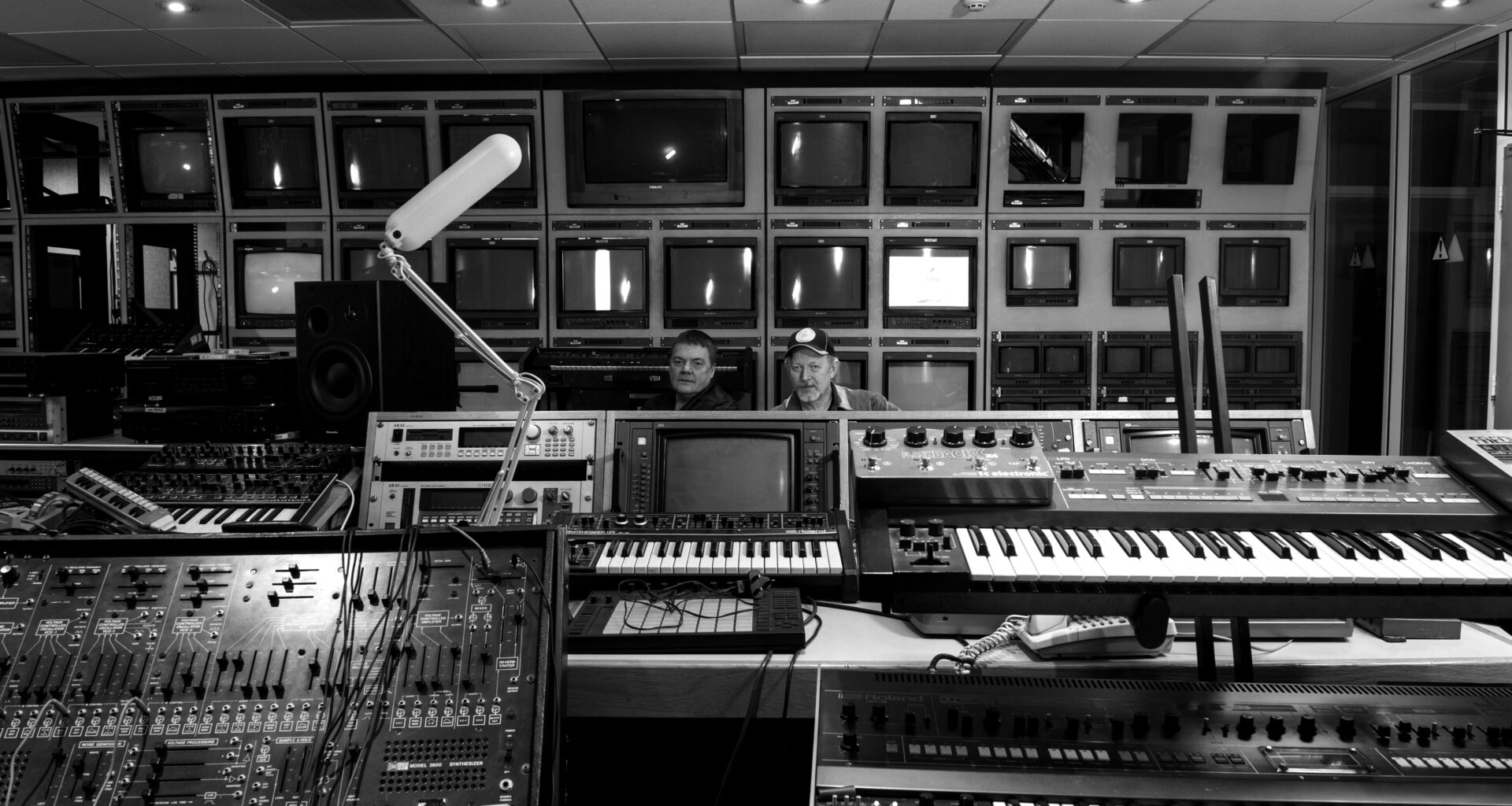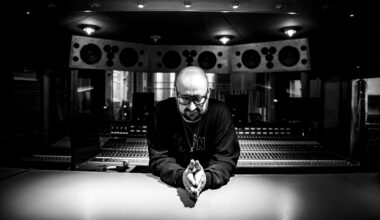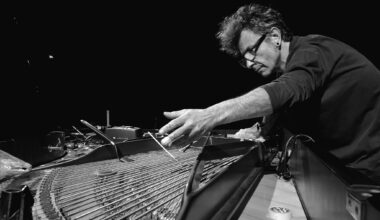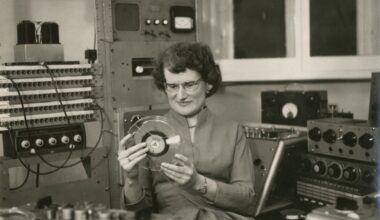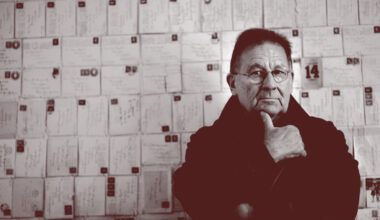‘Transmission Suite’, their first album in 17 years, finds 808 State returning to their core influences of acid house and electro while simultaneously producing a record unhindered by expectations. Graham Massey and Andrew Barker talk Rolands, Manchester, Tony Wilson, Pete Waterman, Cash Generator, and selling pop records by mistake
It’s sunset on 17 June 2017 and 90,000 people are crammed into Wembley Stadium awaiting the arrival on stage of The Stone Roses. There’s been a weird, edgy atmosphere in the crowd during the afternoon, which is not surprising really. Three days earlier, and only a few miles down the road from here, a ferocious fire ripped through Grenfell Tower, taking 72 lives. Many of the audience will have had to travel past its charred shell on their way to the gig today.
Some of the Wembley crowd are already staggeringly drunk and the heady, sweet smell of skunk, safely consumed in the anonymity of the huge throng on the floor of the stadium, is thick in the air floating up to the banks of seats. The pre-show soundtrack, meanwhile, all leading up to the moment when The Supremes’ ‘Stoned Love’ will herald the appearance of the Roses, has brought us everything from Stereolab’s euphoric krautrock knees-up ‘French Disko’ to Man Parrish‘s camp electro anthem ‘Male Stripper’.
But it’s not until the oozing synth pads and the unmistakable sax riff of ‘Pacific State’ by 808 State suddenly comes over the stadium’s sound system that the audience is truly galvanised, instantly and almost visibly becoming one. It’s not just about a nostalgia for the rave era, a time when that feeling of togetherness was a weekly occurrence. It’s almost as if the futuristic optimism, plucked from that golden age between the fall of the Berlin Wall and the collapse of the Twin Towers on 9/11, is something we need to embrace more tightly than ever in the face of austerity, Brexit, and the divide and conquer politics of populism.
Above and beyond such symbolism, ‘Pacific State’ brings 90,000 people out of their collective malaise, getting them on their feet and eliciting a huge roar of approval. By the time the track has worked its magic, it’s clear that the afternoon has passed and the evening is underway. Job done. Rave on.
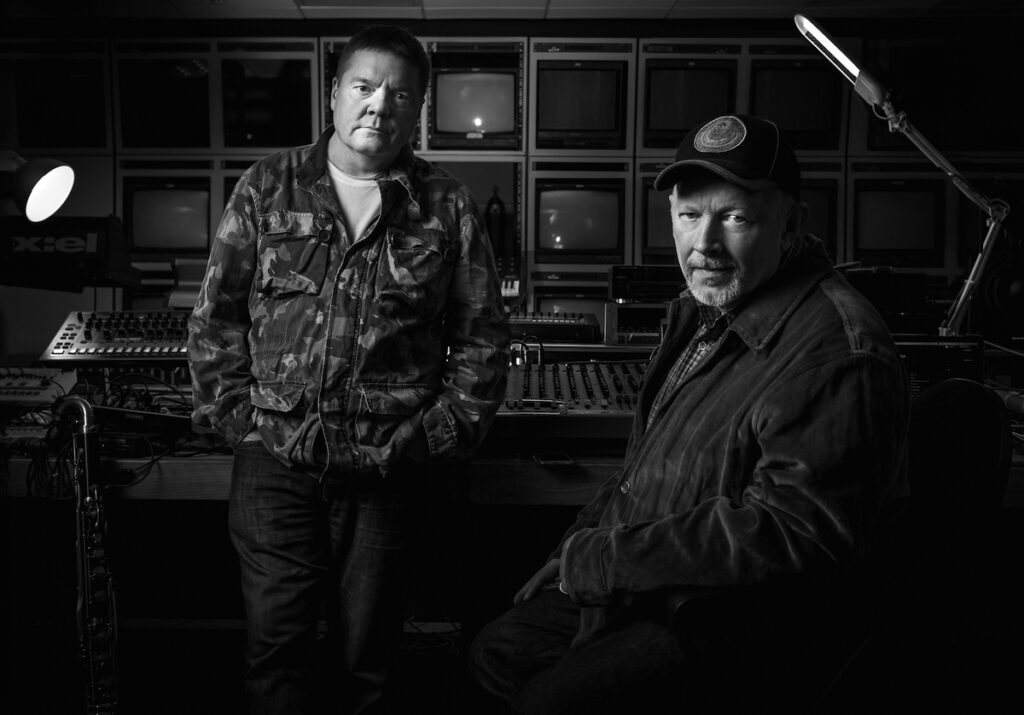
The transformative effect that 808 State’s music can have on a big crowd is not a new thing, of course. Witnessing the Wembley faithful coming together to the strains of ‘Pacific State’ instantly prompts a flood of memories. The spine-tingling experience of hearing the mountainous acid house monsters on 808 State’s seminal debut album ‘Newbuild’ in the spectacular surroundings of Manchester’s G-Mex as the 80s gave way to the 90s. The hyperactive ‘Cubik’ playing as clouds of dust rose above Spike Island. ‘In Yer Face’ rocking tens of thousands at what would turn out to be Factory Records’ farewell party, Cities In The Park at Manchester’s Heaton Park in 1991.
The Ian Browns and Shaun Ryders of this world may have ended up becoming the faces of the cultural revolution that swept through Manchester at the end of the 1980s, quickly spreading out across the UK soon after. But 808 State can justifiably claim to be at the core of its sound.
When we meet up with the band’s two current members, Graham Massey and Andrew Barker, they’re certainly happy to explain the part they played in Manchester’s spectacular rejuvenation. Over lunchtime drinks – Graham ordering a glowing Aperol Spritz, Andrew a slightly less fancy cider – the pair talk with unbridled enthusiasm about the new developments that have shot into the sky in Manchester city centre over the last few years. They’ve witnessed it close up, recording their first album for 17 years, ‘Transmission Suite’, at a temporary studio in the former Granada Television complex, which is now at the heart of the building boom.
Despite the imminent arrival of the wrecking ball, the old Granada site remains steeped in mythology. As well as being the long-time home to the set of ‘Coronation Street’, it was the stomping ground of Factory boss Tony Wilson for many years, and Graham and Andrew say they could very much feel his spirit hovering over the recording sessions. They also had a visitation from another TV ghost of the past.
“The security guard on the gate said to us, ‘Aren’t you 808 State?’,” grins Andrew. “It turned out he’d been one of the dancers when we were on ‘The Hitman And Her’.”
The space that the pair chose to set up shop had been Granada’s visual mixing studio. They ended up in the transmission suite, hence the title of the new album.
“We had a wall of 80 television screens in front of us,” says Graham. “It was like Mission Control in Houston, with all this wonderful old furniture in there, everything curved and ergonomic. I’ve always had this fantasy of a console setting. One of the first bands I ever saw was Tangerine Dream during the ‘Rubycon’ tour, I was about 14 at the time, and I remember looking at the gear and thinking, ‘I don’t understand any of it, I don’t know what they’re doing’, but my fascination with consoles and knobs was planted in my head way back then.”
The developers have the Granada site earmarked as a hotel, so Graham and Andrew had to leave soon after ‘Transmission Suite’ was completed. They don’t seem to mind, though. They’re eager to see what will happen next.
“That whole area is going vertical, going high-rise, with lots of big glass towers,” explains Graham. “It’s an interesting point in time, because when we set off with our little vision of the music of the future, we kind of thought that this would be what Manchester would look like in the year 2000. It’s a bit late, but it’s definitely coming. Manchester has always wanted to be as independent as possible from the capital and this is part of it. It’s a belligerent place and it has enormous possibilities, you know.”
And the roots of those possibilities lie in what went before.
“We definitely think that the first wave of The Haçienda and the rave scene and the Madchester thing helped to ignite this new version of Manchester. It’s a youth culture thing. It’s the way the city uses that energy to then sell it on an international level. It’s nothing to do with commerce, is it? It’s to do with ideas and energy at a youth level.”
Graham admits he felt quite awkward about that relationship in the past. Despite 808 State’s pivotal role in Manchester’s reinvention, the mainstream media’s version of events – focused on more obvious guitar-bass-drums bands – saw them somewhat marginalised.
“I think 808 State had a role in establishing the cultural identity of Manchester,” he says. “But then you get people polarising it down to individuals like Ian Brown and Noel Gallagher, these iconic kind of characters, and that turns it into a personality cult. Whereas no-one looks at how the music actually changed social relationships – and that music was all electronic music. Going to The Haçienda and playing Stone Roses records… that wasn’t really happening, was it Andy? It was the adoption of electronic music as the norm and the realisation of what you could do with that music that was the turning point.”
Ever modest and always ready to prick what he sees as the slightest sign of pomposity on his part, Graham laughs as he says, “It sounds like I’m going, ‘They didn’t recognise us!’, doesn’t it?”. But then, after another moment’s consideration, he adds, “But, yeah, I feel a little bit like that. That was important work.”
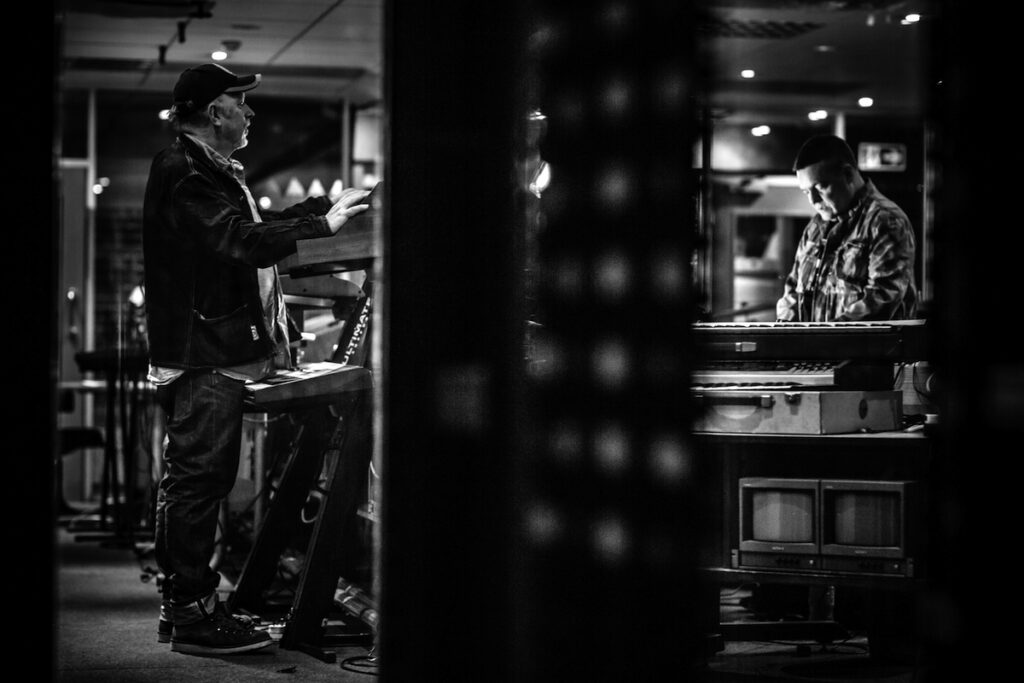
Looking back on their output and their recent 30th anniversary tour, Graham Massey says the friendly conflict within the band – part musicians, part DJs, and with big age gaps between members – contributed to the chemistry that made 808 State so special.
“It was always a bit of a bun fight,” he laughs. “And you can hear that on the recordings.”
The group’s nucleus was formed when Graham, who’d already enjoyed success with post-punk meets improvised jazz-funk outfit Biting Tongues, hooked up with Martin Price, the co-founder of leading Manc record shop Eastern Bloc. Graham was running a cafe across the street from Eastern Bloc at the time and Martin and the shop staff often called in for lunch and brews.
The musical landscape in Manchester at the time was fuelled by several different genres, all of which fed into 808 State’s melting pot of influences. Hip hop and electro remained popular, as was the UK’s long-standing soul scene, but house music was making significant inroads too. Knowing the owner of the city’s leading independent record store meant fast-track access to the latest US imports, as well as a wealth of alternative music.
“Martin had an incredible knowledge of music of all kinds,” says Graham. “He’d always have a big bag of records with him and he’d pull them out and say, ‘I like this’ and ‘I like that’. Later down the line, I was attending an audio engineering course a few blocks away and that gave me access to Spirit Studios. Martin starting bringing projects in to be produced, usually people who had given him tapes at the record shop.”
A few months further on, Graham and Martin started working with Gerald Simpson, soon to become known in his own right as A Guy Called Gerald. The original agenda, according to Graham, was simple.
“We said, ‘OK, we like acid house, so let’s make acid house’. But then it went weird, certain things made it sound very much informed by British alternative music, so it was like an extension of that rather than pure dance music.”
Something else that was weird, at least in retrospect, was the group’s name.
“We called ourselves State 808,” explains Graham. “This got flipped all the time because of an ambiguous logo and it kind of stuck the other way around, so we just went with it. The ‘808’ was a nod to the Roland TR-808 drum machine and the fact it represented electronic club esperanto. We’d used ‘State’ in Biting Tongues titles such as ‘Evening State’ and ‘The Wave State’ and I just liked it as a word.”
It’s a sign of the quite chaotic way that 808 State operated during their rawest days. There are others too. Like the time Tony Wilson saw them playing in a Bolton pub, declared them to be “the new Sex Pistols”, and invited them to play on ‘The Other Side Of Midnight’, his late 80s Granada TV show. “We would have had them on before now, but it’s taken them three weeks to join the Musicians Union,” said Wilson as he introduced the band.
The track they played that night was ‘Pacific State’, but at the time it was called ‘808 State Theme’. Just a short while after that, Graham and Gerald appeared on the same show under the banner A Guy Called Gerald. It seems that everything back then was mixed up and nothing had a proper name.
“It was certainly pretty fluid,” agrees Graham.
But what’s perhaps most remarkable is the fact that Graham and Gerald are happily jamming with a tabletop full of electronic equipment just inches away from a swimming pool in the second of these TV appearances, the setting for this edition of ’The Other Side Of Midnight’ being Manchester’s Victoria Baths.
“I can’t see health and safety regulations allowing that to happen these days,” sniggers Graham. “Especially not with Gerald’s attitude to safety. He never even had plugs on anything. It was usually just two bare wires and a matchstick to hold them in place!”
Gerald left 808 State to pursue his solo project in 1989, which was when Graham and Martin recruited Andrew Barker and also Darren Partington. Much has been made of Gerald’s role in the band’s early material and while his input was clearly important, Graham believes it’s also sometimes been overplayed.
“Gerald was a huge part of the first 808 State album, that’s obviously the case, but I’ve heard people say, ‘Oh, it’s basically a Gerald record’,” he notes. “If you listen to Gerald’s ‘Hot Lemonade’ album, which was done the weekend before, and you compare those two records, the 808 album is much more of a jam in terms of the equipment set-up. A lot of it just goes straight to two-track.”
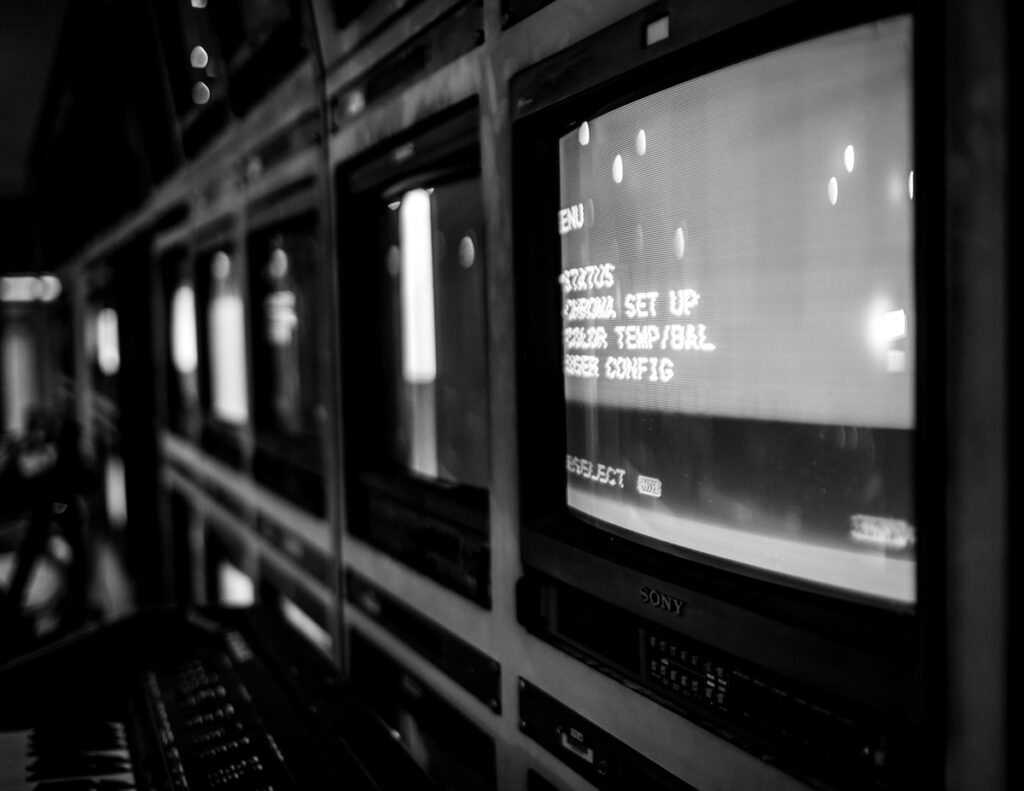
808 State’s ‘Newbuild’ album, like Gerald’s ‘Hot Lemonade’, was laid down at Spirit Studios over the course of a single weekend. The now legendary record is essentially a snapshot capture of the kind of ever-evolving acid house workouts they were playing live at the time. And as you might expect from the band’s name, it’s a bit of a Roland-fest. The armoury includes three SH-101s, a 303, and an 808. Graham thinks there’s a 606 on there somewhere too.
“Everything was kind of triggering everything,” he notes. “The 808 sent triggers to the 101, and then you probably had to have a 606 for more triggers chained to a Roland Sync, which is really tight as well. We always felt quite confident with Roland Sync because everything just moved together in quite a nice way.”
The release of ‘Newbuild’ – the title taken from the name of a Bolton housing co-op – came and went in 1988. It appeared on the band’s own label, Creed Records, and the initial pressing quickly sold out, probably in no small small part thanks to one of the band members owning a record shop, but also because of a lack of competition. It’s often referred to as the first UK rave album, although Graham and Andrew point out they’d actually beaten to the punch by Baby Ford’s ‘Ford Trax’.
The cult status of ‘Newbuild’ was fuelled by being out of print for years. It wasn’t until 2006 that massive 808 State fan Aphex Twin stepped in to reissue the record on luscious triple vinyl through his Rephlex label following a discussion between the two parties backstage at a festival in Turkey. Rephlex also released a collection of rarities and unreleased tracks called ‘Prebuild’, which was the result of Autechre’s Sean Booth badgering Graham to dig through his archives in search of “any old acid”.
It was a year or so after ‘Newbuild’ that the group released the original version of ‘Pacific State’ as the opening cut on the six-track ’Quadrastate’ 12-inch EP. The record was picked up by Radio 1’s Gary Davies and catapulted 808 State into the charts just as Madchester exploded nationally.
“All of a sudden, we were selling pop records by accident,” says Graham. “It was pretty weird stuff – I mean, ‘In Yer Face’ and ‘The Only Rhyme That Bites’, what weird pop records! – but everyone accepted what we were doing as pop music because they were hearing us on Radio 1 in the daytime.”
But at the same time as this, they were also playing live gigs on the burgeoning northern rave scene. It was almost a kind of dual existence.
“They were just parties more than raves in the beginning,” remembers Graham. “You’d go to an old mill in Ancoats and 20 people would turn up. By the third one, there’d be 400 people there.”
Andrew recalls a particularly audacious set-up in Liverpool – a small club with a proper legal license that just happened to be connected to a neighbouring warehouse with room for several thousand punters. To begin with, the police knew so little about the scene they were left alone. One night, which sounds like a surreal dream but actually happened, the band performed on Pete Waterman’s TV show ‘The Hitman And Her’, with a rather rowdy crew from HMS Ark Royal in attendance, and then headed to a rave in Burnley where they ended up getting chased out by police dogs.
By now, Paul Morley had signed 808 to ZTT Records and their audiences started getting bigger, especially after Madchester outfits such as Happy Mondays asked them to support at a series of big G-Mex shows. The band’s sound evolved to suit this new environment and the energy levels rose noticeably in tracks like ‘In Yer Face’ and ‘Cubik’. Around this point, there was also the genre-fusing ‘Tunes Splits The Atom’, which borrowed Mani’s bassline from the breakdown in The Stone Roses’ epic ‘I Am The Resurrection’, pitted it over the bleeps from Sweet Exorcist’s ‘Testone’, and added UK rapper MC Tunes. Was the Roses sample hard to clear?
“Not at all,” chuckles Graham. “We just asked him, ‘Can we nick your bassline?’, and he said, ‘Yes, though I nicked it from someone else’. Andy sees him all the time down the shops. Mani kidnaps him sometimes.”
Martin Price exited the band towards the end of 1991 and the period that followed wasn’t always comfortable for them, even if it did bring a high profile collaboration with Björk, who Graham has written extensively for. There were other interesting partnerships on their rightly acclaimed ‘Don Solaris’ album in 1996, the vocalists including James Dean Bradfield of Manic Street Preachers fame and Lou Rhodes from Lamb. But having been forged in an era when the barrier between an artist and an audience was actively dispensed with, they found it difficult to become a conventional band.
“We wanted to make things look interesting instead of just some guys with their heads down,” notes Andrew. “We did have trouble with that, though. We just weren’t used to being a band in the way most people thought of bands. So, yeah, that was hard. We did struggle with that.”
Much of 808 State’s new album marks a return to the band’s core influences of acid house and electro, albeit with the benefit of a touch of musical hindsight. There’s a defiantly techno aesthetic across ‘Transmission Suite’, though, which is perhaps a result of working with those 80 dormant TV screens in front of them. The whole album sounds very fresh and unhindered by expectations. It also sounds like it was a lot of fun to make.
While the record is purely instrumental – a few collaborations with a few singers were mooted along the way, but nothing actually transpired – there are some great vocal samples on there. There’s an international mix to the voices, from the cryptic Japanese of the joyful and brilliant ‘Tokyo Tokyo’, the opening track of the album, to eerie South American incantations and sultry female French tones.
“It is a bit like an atlas,” concedes Graham, while Andrew marvels at the ability of music to instantly transport you – via the imagination, at least – to anywhere in the world in an instant.
At the same time, they insist that the global vibe was in no way deliberate.
“It’s funny with that ‘Tokyo Tokyo’ track,” continues Graham. “We first put it out as a single a couple of months ago and there was loads of Twitter activity from Japanese people saying, ‘What are they up? What does it mean?’. They seemed to be really confused by it. But it doesn’t mean anything. It was just the notes in the vocal sample that appealed to me.”
It’s the same with the titles of the tracks on the album. Some of them sound quite exotic or perhaps even otherworldly – ‘Ujala’, ‘Huronic’, ‘Pulcenta’ and ‘Angol Argol’, for instance – but they’re just words that the pair liked, just as Graham liked “State” back in his Biting Tongues days.
“We always come up with loads of mad titles when we’re recording,” he adds. “It’s a nightmare with spellcheck because it’s constantly telling us that a word is wrong. The titles usually get changed near the end of the process to make more sense, you know. Well, a bit more sense anyway.”
Get the print magazine bundled with limited edition, exclusive vinyl releases

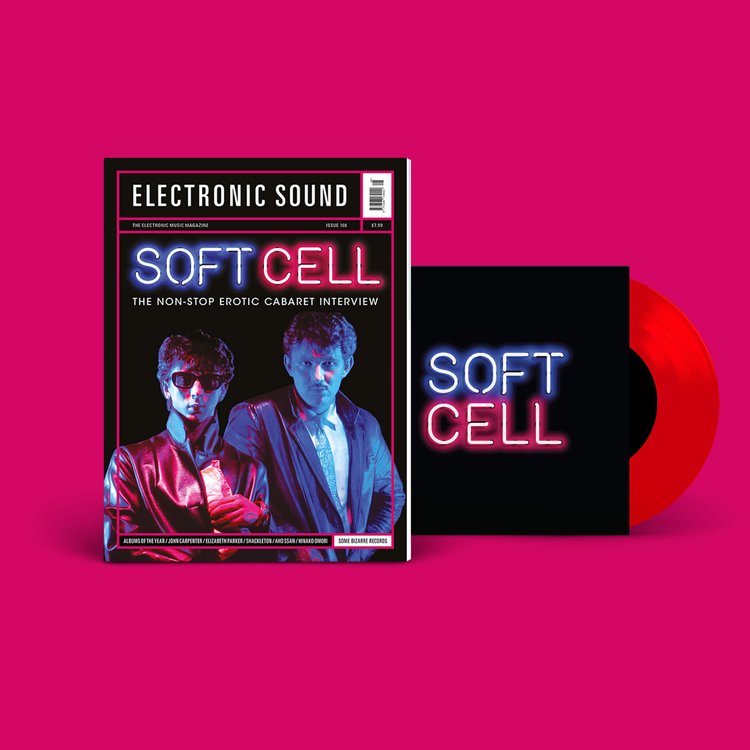
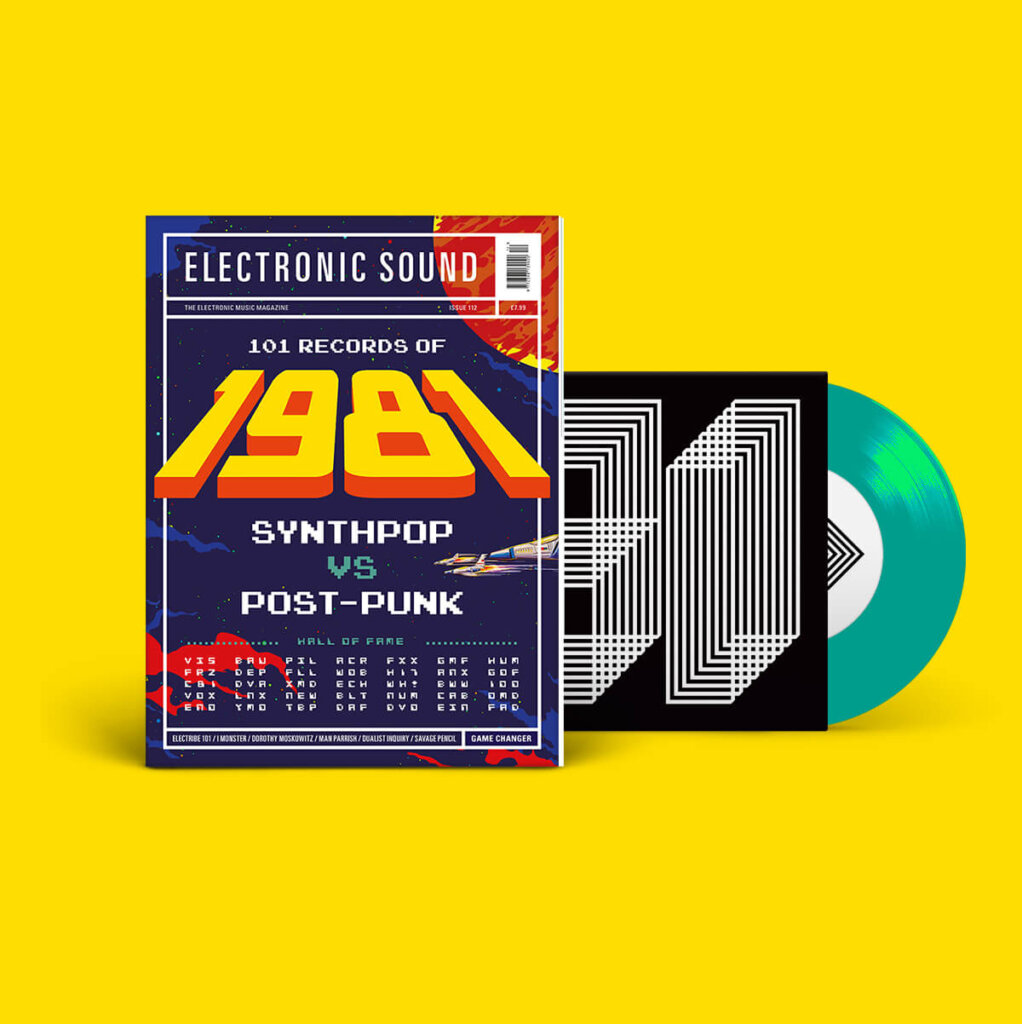
Choosing titles for the tracks was probably a much easier task than selecting the tracks themselves, mind. The band recorded a total of around 40 pieces over the course of a two-year period and then had to pare this substantial body of work down to a mere 15 cuts for the album. What’s more, they only did this at the very last minute.
“This album could have been many things,” says Graham. “We generally like a lot of variety on our albums, but with this one we’ve contained it a bit, restricting it to more obviously electronic sounds. It’s kind of like interior design, so starting off with a room that has lots of junk in it and then saying, ‘Right, let’s chuck this out, let’s chuck that out’, although it’s never as simple or easy as that. Every one of those decisions was actually quite painful. Most of the stuff we lost were pieces that were more soundtracky, more orchestral, so they often incorporated less electronic instruments.”
“When it came down to it, we thought we needed to look at this in a different way,” adds Andrew. “It could have been all over the place but it’s not. It flows because it’s got more of an overall theme to it.”
“It’s a return to what I’d call social music,” says Graham.
What he means by this is music for social situations, as opposed to something to listen to in isolation at home. So is he primarily thinking of the dancefloor?
“This album is informed by clubbing,” he replies. “We asked the question, ‘Could you play it alongside other music in nightclubs?’. Well, my kind of nightclubs anyway.”
Which is an important clarification. ‘Transmission Suite’ is certainly a lot more esoteric than your traditional techno club fare. But then 808 State have never been interested in what passes for traditional or conventional. Which is probably one of the reasons why, while they’re still likely to froth at the mouth at the sight of certain pieces of vintage kit, some examples of which they’ve used on their new album, they’re not sniffy about using the new imitations of classic gear that are emerging. Especially if it means they can walk on and off a plane with something or quickly source it in a foreign city. As Graham points out, old staples like Roland D-50s or Juno 106s are becoming hard to hire in an emergency.
“We’ve never splashed big money on equipment,’ he concludes with a big smile on his face. “We’re much more of a Cash Generator type of band!”
‘Transmission Suite’ is out on 808 State
